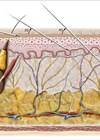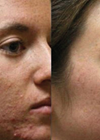Menopause, which begins one year after the last period, can bring with it some noticeable changes to skin and hair. As hormone levels drop, skin can become dry, slack, less elastic and thin. It can also cause more facial hair and scalp loss. The skin may be impacted in several ways, including:
- Becoming more reactive, both to ingredients and the environment
- More prone to allergies
- Dryness
- Wrinkling and sagging
- Acne
- Redness and rosacea
- Hyperpigmentation
- Easy bruising
Further changes in skin pH and sporadic fluctuations in hormone levels in perimenopause can also exacerbate existing skin conditions such as acne, rosacea, eczema and psoriasis. There are three key hormones that can cause changes to the look and feel of the skin: oestrogen, progesterone and testosterone.

Oestrogen helps to stimulate collagen, elastin and hyaluronic acid production that helps the skin to stay plump and firm. It has a huge impact on the skin, with significant effects on physiology and the modulation of keratinocytes, fibroblasts and melanocytes. In addition, skin appendages including the hair follicle and the sebaceous gland are also regulated by oestrogen. As oestrogen decreases, so does the production of collagen which can lead to facial volume loss, a decrease in skin thickness and facial sagging and wrinkles. In fact, research shows that women gradually lose about 30% of collagen over the first five years of menopause. Oestrogen can protect the skin from UV exposure, so without this added protection, it’s important to apply sunscreen daily to prevent age spots.
Progesterone stimulates the production of sebum from the oil glands in the skin. It can cause the skin to swell and compress the pores from which the sebum is excreted. As progesterone levels can also increase during menopause, too much can lead to an oil build-up, exacerbating acne.
Testosterone, which is typically present during menstruation, works similarly to progesterone by activating the sebaceous glands to produce oil.
With each hormone playing an integral role in the function of our skin, fluctuations in these hormone levels have been linked to the acceleration of ageing skin. The loss of structural architecture, increased dryness, atrophy, fine wrinkling and poor wound healing are all typical implications of this change.
It is therefore important to rethink the skincare routine for patients going through menopause. As the skin is undergoing drastic changes, products which patients have been using before may no longer be so effective. It’s important to remember that the root cause of these changes is different to other pre-existing skin conditions.
Everyone’s skin is unique, and so the pedi-, intra- and post-menopausal impact will be different amongst individuals. This is highlighted in common confusion between hyperpigmentation and melasma for example.
While nourishing the skin with active ingredients is important, it will not be sufficient on its own at this stage. The skin must be sustained with products and ingredients that help promote production of substance, such as collagen, which naturally declines with ageing. Tailoring skincare products to patients’ specific needs is key. For example, cooling skincare products may be more suited to those experiencing erythema and flushing. Taking vitamin and collagen supplements can help with the loss of collagen associated with decreasing oestrogen levels. Skin cell renewal declines during this time with a lower level of sebum, so the skin can become dull and lack vitality if not properly looked after. Using collagen and vitamin C supplements for menopausal skin can be a good step to boost cell production. Other useful tips for patients include:
- Wash with a mild cleanser instead of soap. For mature skin, soap can be too drying.
- Apply moisturiser after bathing and throughout the day when the skin feels dry. A moisturiser with hyaluronic acid, (HA) ceramides or glycerine can be especially helpful.
- Use a fragrance-free moisturiser, this can reduce irritation.• Use a high-concentration vitamin C serum.
- Use products containing urea.
- Use stem cell or growth factors / wound healing products.
To treat collagen loss, some individuals may opt for:
- Taking collagen supplements or eating foods rich in collagen (i.e. fish, chicken, egg whites) to help nourish from the inside out.
- Retinol can also help to stimulate collagen. However, a caveat with collagen, retinol and HA supplements taken orally – by the time it is absorbed by the gut, and because of the gut barrier, it is very likely that there is minimal absorption at the skin cellular level.
There are products and skincare ranges which have been formulated especially for menopausal skin. These usually contain higher concentrations of potent active ingredients to sooth and improve skin quality, accounting for the decline in natural products. Typically, medical-grade skincare offers better quality ingredients at optimum concentrations and are cleaner with less preservatives.
What to avoid?
There are a few habits and practices that patients should skip to help reduce the damage to the skin during this period, such as:
- The use of chemical sunscreens as they can impact the skin biome.
- Trans fat, refined sugars and carbohydrates – these affect the gut microbiome and in turn the gut-skin axis.
- Products that can dry out the skin (harsh scrubs, exfoliants).
- Long, hot or frequent showers.
A good skincare routine put in place before menopause commences can help ease the transition as the skin begins to change. Navigating these changes may seem overwhelming at times for patients, and it is important to educate and manage their expectations, as their skin needs may change throughout the different stages of this transitional journey.A good skincare routine put in place before menopause commences can help ease the transition as the skin begins to change
Declaration of competing interests: None declared.
COMMENTS ARE WELCOME










